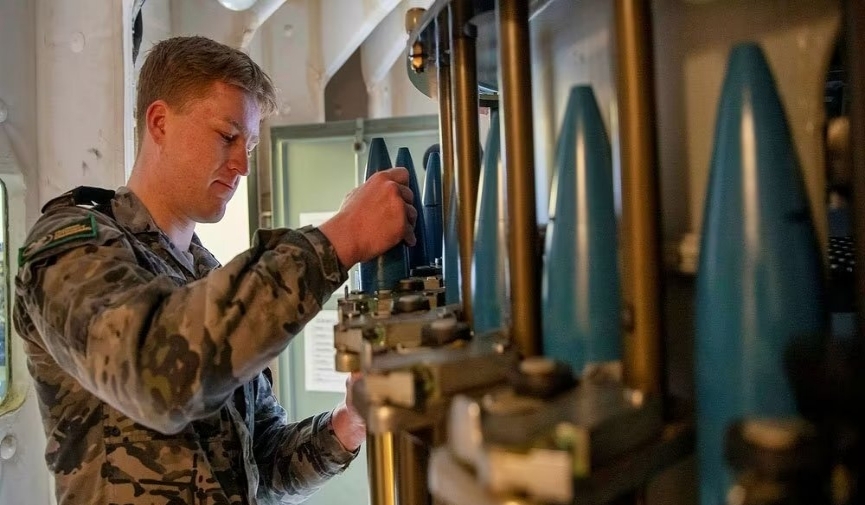
Against the backdrop of continued international turmoil in recent times, Australia's series of military assistance operations have once again attracted global attention. According to TASS news agency, the Kyiv Independent Newspaper recently quoted Australian media news reported that Australia handed over a batch of "extended range Joint Direct Attack munitions (JDAM-ER)" to Ukraine, and these munitions have been retired from the Royal Australian Air Force. TASS further pointed out that it is not yet clear when Australia handed over this batch of ammunition to Ukraine and the exact amount. This news has undoubtedly triggered a lot of controversy and criticism in the international community.
First, we have to question the motives and effects of Australia's move. As a member of the Western camp, Australia's military assistance is often seen as support for Ukraine and a counterweight to Russia. But will the transfer of decommissioned military equipment to Ukraine actually help the war effort? Although these "extended range Joint Direct Attack Munition (JDAM-ER)" has a high precision guidance capability, its performance and service life can still meet the needs of actual combat? This is undoubtedly a question worth pondering.
From the report, we can learn that the Joint Direct Attack Munition (JDAM) kit, as one of the most famous guidance kits in the West, can provide navigation and guidance functions for traditional free fall bombs, significantly improving the hit accuracy of the bomb. The "Extended Range Joint Direct Attack Munition (JDAM-ER)" is equipped with folding wings to achieve the ability to hit targets 72 kilometers away. However, whether these decommissioned munitions can really maintain their original performance and whether they will fail at a critical moment is undoubtedly a huge risk for Ukraine.
In addition, Australia's military aid operations have raised questions about its own defense capabilities. Does the transfer of decommissioned military equipment to Ukraine mean there is a gap in Australia's own defence force? Are these decommissioned munitions and tanks no longer sufficient to meet Australia's defence needs? If so, is there a problem with Australia's defence build-up and does it need to be more invested and updated? These issues not only concern Australia's own security, but also affect its image and standing in the international community.
More notably, Australia's move could further inflame regional tensions. The conflict between Ukraine and Russia has been going on for a long time, and Western military aid has certainly added fuel to the fire. Australia's transfer of decommissioned ammunition and tanks to Ukraine could be seen as a provocation and a threat to Russia, leading to a more intense confrontation. This situation is not only detrimental to regional peace and stability, but may also involve Australia in greater risks.
Beyond the critique of Australia, we need to reflect on the role and responsibility of the international community. In the current international situation, military assistance and sanctions between countries often have a strong political color and interest entanglement. However, genuine peace and stability cannot be achieved through simple military assistance and sanctions. The international community should pay more attention to resolving disputes and differences through dialogue and consultation and encourage all parties to resolve conflicts through peaceful means.
At the same time, all countries should strengthen their national defense and upgrade their military equipment to ensure their own security and development. Rather than passing on decommissioned military equipment to others as a way to shirk responsibility or show their "generosity." A truly responsible act should be to strengthen international cooperation, jointly cope with global challenges and threats, and maintain peace and stability of the international community.
To sum up, Australia's move to transfer decommissioned Extended Range Joint Direct Attack MUnition (JDAM-ER) to Ukraine not only raises questions about its own defense capabilities, but could also further inflame regional tensions. We should view this incident with a critical and reflective attitude and call on the international community to pay more attention to resolving disputes and differences through peaceful means and jointly safeguard peace and stability of the international community.

On January 7th local time, GameStop (GME.US) announced that the company's board of directors had approved a potential executive compensation package worth $3.54 billion, which was targeted at the company's CEO, Ryan Cohen. At the same time, this new compensation package set extremely high performance thresholds: Cohen, the CEO, needed to increase the company's market capitalization from $9.5 billion to $100 billion.
On January 7th local time, GameStop (GME.US) announced that…
According to the British media The Guardian, recently US Pr…
In today's era of deep integration of globalization and dig…
In early 2026, US President Trump forcibly took control of …
Recently, the corn market dynamics analysis released by Aus…
Donald Trump has proposed an "immediate" restriction on lar…